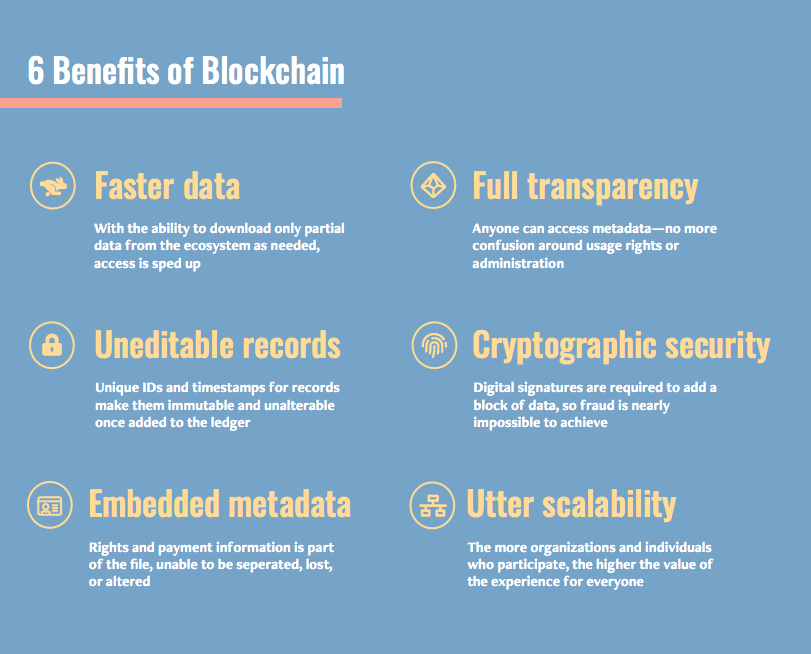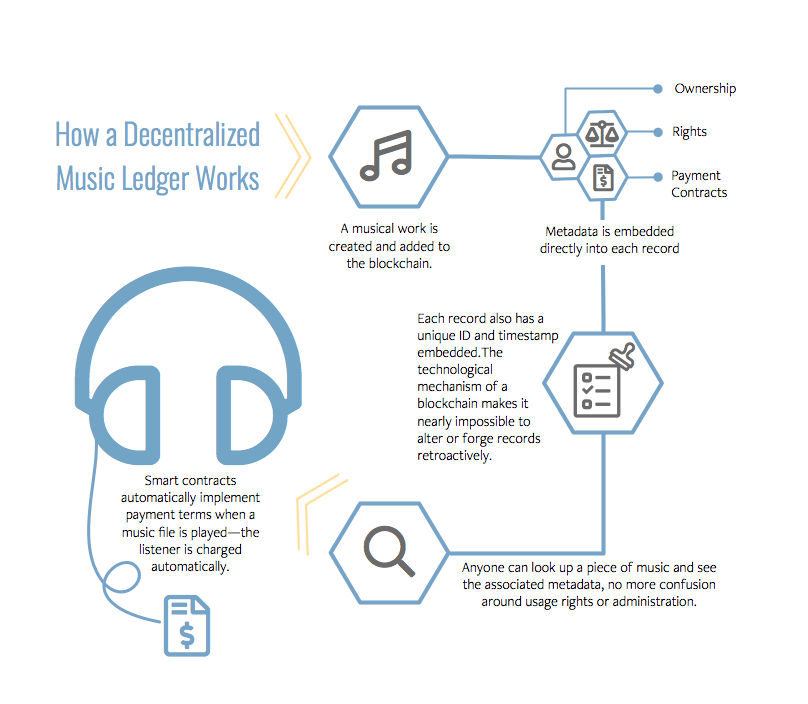In the expanding ecosystem of the music industry, a longtime problem has become more and more pressing: no authoritative source of music data exists, making it difficult to track down rights-holders and ensure they get paid. The Global Repertoire Database (GRD) was created in 2008 with hopes that it would be the comprehensive, singular record of music copyright ownership, ultimately leading to a more transparent, efficient, and cost-effective rights-management solution. But the GRD failed, a debt of $13.7 million in its wake.[1]
Now, a radical new solution is on the horizon: blockchain technology could be the music industry’s revenue savior, offering the answer to transparent, efficient, and cost-effective rights management.
The foundational data structure behind blockchain is a digital transaction ledger dispersed among a distributed network of computers. Musical works are published right on the blockchain, with embedded metadata detailing ownership rights and payment information. As songs are created and encoded, they’re added to the the ledger with a unique ID and timestamp, making them immutable and unalterable. A decentralized global database roars to life.
The Benefits of a Blockchain Solution for the Music Industry
There are literally hundreds of thousands of ways artists and rights-holders can make money off of musical works. The applications of blockchain to solve the myriad problems associated with royalty payments are valuable.
The lack of an authoritative database means that data today is often incomplete, disconnected, fragmented, and out of date. This situation leads to incredibly slow and often errant payout times. A blockchain ledger that contained all the metadata for each song—ownership, performance info, copyright ownership, and usage rights—would solve this problem.
Via that embedded metadata and the potential of micropayments, blockchain would create more direct connections between contracts, transactions, and payments. Music makers and rights owners could assign and track rights and usage in real time, getting paid directly and instantly via smart contracts—self-executing contracts written into lines of code.
With blockchain, consensus ensures that shared ledgers are exact copies, and that everyone has access to the same information. This transparency reduces the need for audits, which results in cost savings for record labels, PROs, and streaming services. And the self-correcting technological mechanism of Blockchain makes it nearly impossible to alter or forge records retroactively. A network of distributed ledgers keeps copies of each record on the computers of all network nodes, or system participants.
Perhaps most exciting, blockchain technology could eliminate the problem of money being left on the table. The average song has a minimum of eight collaborators. There can be as many as fifty intermediaries between the consumer and the person who created the song. The benefits of blockchain and the distributed ledger include reduced operational and administrative costs typically spent on intermediaries to facilitate licensing and royalty distribution services. Cost savings can enable rights holders with the opportunity to negotiate better rates and take home more money.
Music-rights organizations, record labels, and streaming music services would be empowered with the data to better understand and control revenue streams, identify trends, and make more informed business decisions. At the same time, data tailored to the role of the rights holder has the potential to dramatically reduce and even eliminate concerns about underpayment of royalties. Such democratic reporting lends itself powerfully to the perception and the reality that all parties have equality in the music-rights formula.
The Challenges of Implementing a Blockchain Solution
With so much at stake, why hasn’t a blockchain rights-management solution been launched yet? In many ways, a blockchain solution would have to overcome some of the same challenges as the GRD, but with higher stakes on the heels of such a high-profile failure.
The first challenge is legal. Obviously, the regulatory ramifications to any new global music-rights ledger are complex to navigate. Music-rights laws vary around the globe, and blockchain regulation is evolving quickly on state, federal, and global levels. Were a blockchain solution to be developed, it would have to be aligned with developing laws and ICO regulation, keeping security of information paramount in every decision.
Perhaps a bigger challenge to building a music-rights database on blockchain is the question of exactly which technology platform it should be built on. The marketplace is rife with blockchain options, but there is no clear standard yet. Big names in blockchain are emerging, but the best solution for this application has not emerged.
Possibly the greatest challenge is going to be convincing all the stakeholders to come back to the table and start again. The GRD failure was disheartening, and the big question would be around funding. Who is going to foot the bill to create an open global solution? For a blockchain solution to succeed, it would require magnificent coordination and agreement between several parties with very different strategic goals.
Yet, unless all participants buy in, it won’t work. It’s already technologically possible to implement a blockchain solution for music-rights management. And it certainly benefits the music industry to be ahead of the disruption blockchain will inevitably bring every sector of business in the near future. The challenge is largely one of mindset, at this point. It’s a matter of getting everyone back to the table, sussing out funding roles, and identifying first-mover advantage.
While a blockchain solution for music rights will still have risks associated with change management, data conversion, and regulations, if implemented properly, it could solve the largest issue of centralized power and will surely benefit the entire industry. The paradigm shift is enormous—and it will take experienced change management to institute a smooth and successful transition—but the shift will benefit every stakeholder in music today, and transform rights management as we know it.
To read more about blockchain and the music industry, download the full version of our paper here.
[1] http://www.thembj.org/2015/08/grds-failure/


